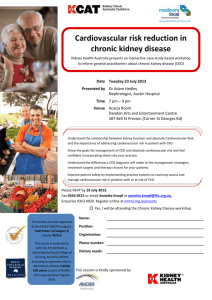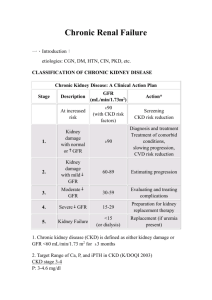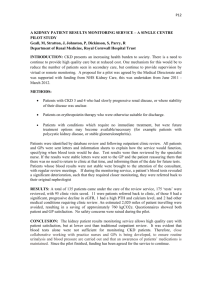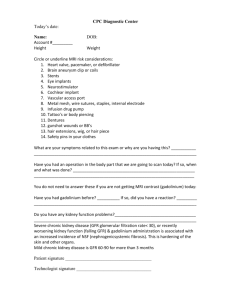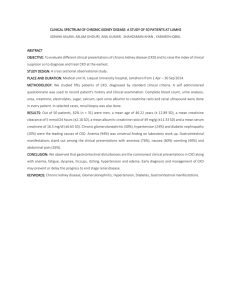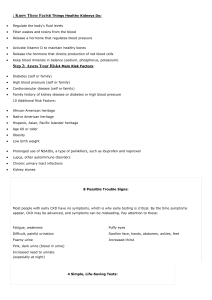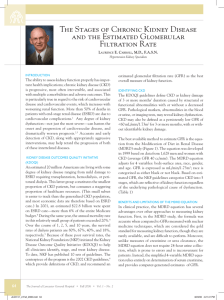What is Chronic Kidney Disease (CKD)?
advertisement
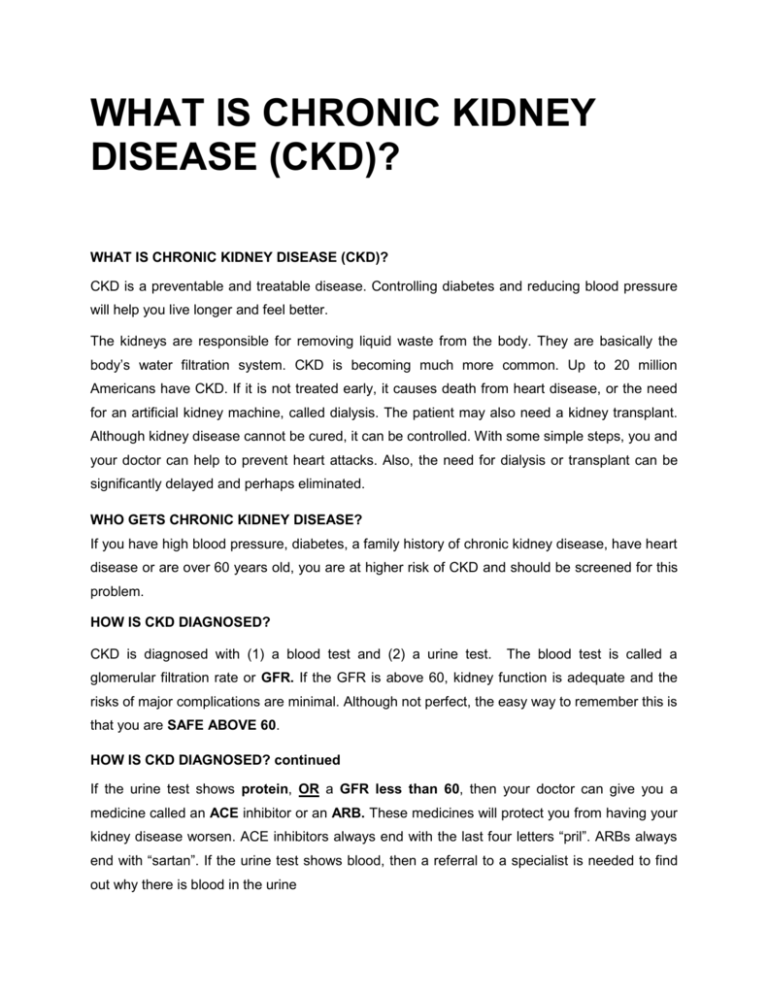
WHAT IS CHRONIC KIDNEY DISEASE (CKD)? WHAT IS CHRONIC KIDNEY DISEASE (CKD)? CKD is a preventable and treatable disease. Controlling diabetes and reducing blood pressure will help you live longer and feel better. The kidneys are responsible for removing liquid waste from the body. They are basically the body’s water filtration system. CKD is becoming much more common. Up to 20 million Americans have CKD. If it is not treated early, it causes death from heart disease, or the need for an artificial kidney machine, called dialysis. The patient may also need a kidney transplant. Although kidney disease cannot be cured, it can be controlled. With some simple steps, you and your doctor can help to prevent heart attacks. Also, the need for dialysis or transplant can be significantly delayed and perhaps eliminated. WHO GETS CHRONIC KIDNEY DISEASE? If you have high blood pressure, diabetes, a family history of chronic kidney disease, have heart disease or are over 60 years old, you are at higher risk of CKD and should be screened for this problem. HOW IS CKD DIAGNOSED? CKD is diagnosed with (1) a blood test and (2) a urine test. The blood test is called a glomerular filtration rate or GFR. If the GFR is above 60, kidney function is adequate and the risks of major complications are minimal. Although not perfect, the easy way to remember this is that you are SAFE ABOVE 60. HOW IS CKD DIAGNOSED? continued If the urine test shows protein, OR a GFR less than 60, then your doctor can give you a medicine called an ACE inhibitor or an ARB. These medicines will protect you from having your kidney disease worsen. ACE inhibitors always end with the last four letters “pril”. ARBs always end with “sartan”. If the urine test shows blood, then a referral to a specialist is needed to find out why there is blood in the urine 8 ACTIONS YOU CAN TAKE TO PROTECT YOURSELF IF YOU HAVE CKD 1. MEDICATIONS YOU SHOULD AVOID NSAIDS and Cox-2 inhibitors raise blood pressure and make the kidney disease worse. (Motrin, Aleve, Advil, Ibuprofen, Naprosyn, Celebrex, Mobic, Relafen and others). If your GFR is below 60, you should have your doctor stop prescribing these medicines and you should avoid buying them over the counter. METFORMIN is a diabetes medication that does not harm the kidney, but if the kidney starts to fail or there is not enough water in the system, called dehydration, there is a potentially fatal side effect called lactic acidosis. This side effect is rare, but when it occurs, the patient frequently dies. BISPHOSPHANATES: These are used for the treatment of osteoporosis, a thinning of the bone that could cause fracture. These go under the names Actonel, Boniva, and Fosamax. If the GFR falls below 30, these should not be used. Before using these medications, make sure your Vitamin D level is sufficient. They will not protect your bones if there is not enough Vitamin D in your body. PHOSPHATE PREPARATIONS: If you are having a colon test called a colonoscopy, to detect cancer, and the doctor prescribes Fleets, phosho soda, this can cause kidney failure even in normal people. Safer alternatives of Go-Lytely or Nu-lytely are available. 2. SEE IF YOU ARE ON AN ACE OR ARB: These medications help to reduce blood pressure and protect the kidney. 3. TAKE ASPIRIN 81 MG A DAY. BUT do not take this if you have a bleeding problem or are taking a blood thinner, like Coumadin, unless you discuss it with your doctor. 4. NUMBERS YOU SHOULD KNOW: Blood pressure should be less than 130/80 Hemoglobin (blood count) should be greater than 12.0 for women or 13.5 for men Hemoglobin A1C (3 month average blood sugar control) should be less than 7.0 HDL (good cholesterol) should be greater than 40 LDL (bad cholesterol) should be less than 100 Triglycerides (fats in the blood) should be less than 150 Vitamin D should be greater than 30 5. EAT A HEALTHY DIET: If you have severe CKD of GFR less than 30, see a renal dietician. Drink lots of water Eat whole grains Eat fruits and vegetables (Be careful with potassium—Bananas and tomatoes are high in this) Avoid excessive salt, sugar, and alcohol


